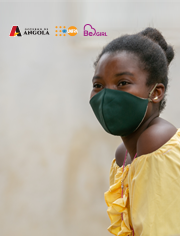UNFPA's Report on the Impact of Be Girl Menstrual Health in Angola Program exposes the urgent needs of Angolan girls during menstruation

Menstruation is a period of deprivation and stigma for thousands of girls and women in Angola. The consequence that gender inequality, poverty or even folklore have on the lives of Angolans during the menstrual cycle was the focus of the presentation on the Impact Report of the Being a Girl Program in Angola that the United Nations Fund for Population (UNFPA) presented in the past the 28th of May.
Menstrual health is a human right. Since 2014, the 28th of May is dedicated to the awareness of menstrual hygiene. Adata aims to promote the education of girls and women and show the importance of good hygiene during the menstrual period.
To mark the occasion, UNFPA presented the Impact Report of the Be Girl Program in Angola, a government project in partnership with the agency and other civil society organizations. Between December last year and last January, this program raised awareness of 2,000 boys and girls in Luanda, Huambo, Lunda Sul and Huíla about menstrual health. During about fifty sessions, two thousand menstruation panties and two thousand menstrual clocks were distributed. Under the program, 27 trainers were trained in menstrual health.
The live presentation of the detailed results of the Be Girl project in Angola included the participation of Zuleica Wilson, television presenter and Miss Angola 2013, and Igor Benza, model and important figure in national television.

In this dialogue, supported by Ikena Carreira, UNFPA Communication, Partnerships and Resource Mobilization Officer, and Paula Andrade UNFPA Knowledge Management Associate, various issues were addressed on menstrual health for girls and women around the world and solutions for improving social conditions to enable continuous menstrual health in the world and in particular in Angola.
There are many factors that prevent the full implementation of the fundamental human rights of girls and women during menstruation, such as education, health, water and sanitation and non-discrimination and gender equality. Factors such as humanitarian crises and harmful traditions, combined with the lack of economic resources of many women and girls, also make it difficult for them to access menstrual hygiene products and the dignity to which they are entitled.
On the other hand, menstruation-related stigmas and norms often reinforce discriminatory practices. Barriers related to menstruation at school, at work, in health services and in public activities also perpetuate gender inequalities, creating obstacles to educational and employment opportunities and the empowerment of women and young adolescents.
During the launch of the Impact Report of the Ser Menina Program in Angola, reflection was also given on the topic of Menstrual Health for girls and women, its cascading effects on the Community and what investments can be made so that, in 2030, all girls and women can manage their Menstrual Health with Comfort, Confidence and Dignity. During the live broadcast, videos were also broadcast with testimonies of young people who received support and training. With their voice and experience, they helped to mirror the work of the activists of this project in Angola.


